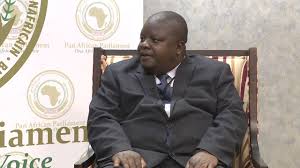Chairperson of the PAP Committee on Trade, Customs and Immigration, Hon Dr. Tapiwa Mashakada says there is need for enhanced regional cooperation to tackle the issue of migration.
An estimated 34 million people in Africa are migrants and Libya currently plays host to 621 706 of this figure. Of the 621 706 migrants in Libya, 575 569 are African nationals.
“We do not condone any form of slavery. Recent developments in Libya whereby Africans are perpetrating slavery on fellow Africans are unacceptable,” Dr. Mashakada emphasised, adding that obvious factors driving people away from their countries of origin – issues such as poverty, unemployment and conflict should not be ignored. “African governments should diligently work to solve these issues,” he said.
The International Organization for Migration (IOM) has been working closely with the African Union to repatriate 13 000 migrants by January 2018, following shocking reports of the slave trade in Libya.
So far, migrants have been returned to 30 different countries using both charter and commercial flights with the largest returns being to West Africa – Nigeria, Mali, Guinea, and Gambia.
IOM says there is irregular migration from the Horn of Africa to Gulf States, Europe and Southern Africa. There is also marked migration from West and Central Africa to Northern Africa and eventually to Europe.
Naomi Shiferaw of the IOM told the Pan African Parliament Committee on Trade, Customs and Immigration that there are around 5 189 migrants currently in detention in Libya. These migrants are vulnerable to different abuses.
“Migrants in Libya face various forms of abuse. They are held against their will, work without pay and some are sexually abused,” said Shiferaw.
IOM says children represent 10 percent of interviewed migrants and they also report having experienced some form of abuse.
Chairperson of the PAP Committee on Trade, Customs and Immigration, Hon Dr. Tapiwa Mashakada, said Parliamentarians were concerned with present day slavery.
According to UNDESA, of the estimated 34 million African migrants, 52 percent of these move within Africa and remain in their region. As of December 2016, there were about 5.1 million refugees in Africa. 12.4 million people were internally displaced due to conflicts and disasters as of December 2015.
IOM has employed various intervention techniques in Libya. These include the identification of vulnerable migrants, provision of health assistance, providing alternatives to detention, protection, monitoring and detention centre profiling, human rights training, awareness raising campaigns, and, post arrival and reintegration support for returnees.
The organisation says African governments should move to tap into the untapped potential of intra African labour mobility. The organisation says it is high time African countries made use of skilled labour within the continent instead of acquiring the skills from outside the continent.
